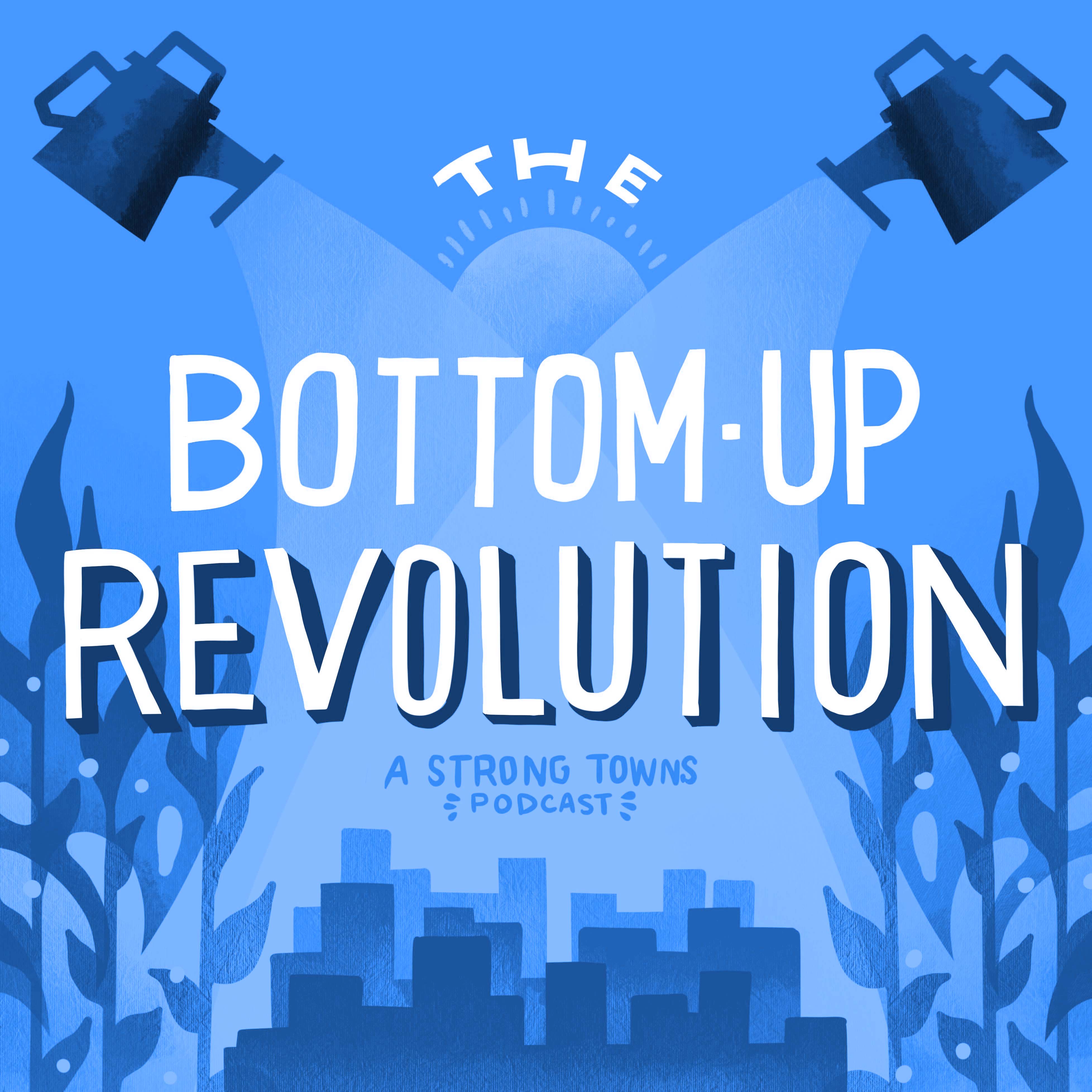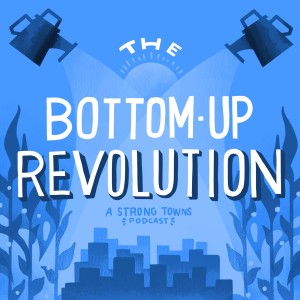
570.2K
Downloads
308
Episodes
The Bottom-Up Revolution features the stories of the Strong Towns movement in action. Hosted by Tiffany Owens Reed and Norm Van Eeden Petersman, it's all about how regular people have stepped up to make their communities more economically resilient, and how others can implement these ideas in their own places. We’ll talk about taking concrete action steps, connecting with fellow advocates to build power, and surviving the bumps along the way—all in the pursuit of creating stronger towns. Each episode features a Strong Towns advocate who is making positive change in their community.
The Bottom-Up Revolution features the stories of the Strong Towns movement in action. Hosted by Tiffany Owens Reed and Norm Van Eeden Petersman, it's all about how regular people have stepped up to make their communities more economically resilient, and how others can implement these ideas in their own places. We’ll talk about taking concrete action steps, connecting with fellow advocates to build power, and surviving the bumps along the way—all in the pursuit of creating stronger towns. Each episode features a Strong Towns advocate who is making positive change in their community.
Episodes

Thursday Jul 17, 2025
How Community Gardens Can Make Cities Stronger
Thursday Jul 17, 2025
Thursday Jul 17, 2025
Linda Appel Lipsius is the executive director of Denver Urban Gardens, where she supports a network of over 200 gardens and food forests that produce 650,000 pounds of food annually. She also helps launch initiatives to help make Denver a greener, more food-resilient place.
Linda and Tiffany discuss the importance of nature in urban resilience and the benefits of community gardening, from access to healthy food to community building and mental health improvement. Linda explains how a permaculture design philosophy can help cities become more resilient.
ADDITIONAL SHOW NOTES
-
Local Recommendations:
-
Tiffany Owens Reed (Instagram)
-
Do you know someone who would make for a great Bottom-Up Revolution guest? Let us know here!
This podcast is made possible by Strong Towns members. Click here to learn more about membership, including member-exclusive perks.

Tuesday Jul 15, 2025
Bottom-Up Shorts: Giving People Better Transportation Options
Tuesday Jul 15, 2025
Tuesday Jul 15, 2025
Wendy Nash is the founder of Get Around Caboolture, a grassroots transportation initiative in Caboolture, Australia. She and Norm discuss the group's efforts to promote more transportation options, including hosting the first Week Without Driving outside the U.S. Wendy emphasizes the importance of tailoring messages to different audiences and explains why she would like to see more comedy in advocacy.
ADDITIONAL SHOW NOTES
-
Norm Van Eeden Petersman (LinkedIn)
-
Do you know someone who would make for a great The Bottom-Up Revolution guest? Let us know here!
This podcast is made possible by Strong Towns members. Click here to learn more about membership, including member-exclusive perks.

Thursday Jul 10, 2025
Brandi Thompson: Driving Change Through Civic Empowerment
Thursday Jul 10, 2025
Thursday Jul 10, 2025
Brandi Thompson is the “accidental” co-founder and leader of Strong Towns ABQ, a Local Conversation in Albuquerque, New Mexico. She’s lived in eight states and has worked as a rattlesnake wrangler, a grant writer, and a teacher. She currently works as a flight nurse, providing care to patients who need to be air-lifted to the hospital.
Today, Brandi sits down with Tiffany to discuss the strategies that have helped Strong Towns ABQ successfully advocate for zoning reform and against highway expansions.
ADDITIONAL SHOW NOTES
-
Strong Towns ABQ (site)
-
Local Recommendations:
-
Tiffany Owens Reed (Instagram)
-
Do you know someone who would make for a great Bottom-Up Revolution guest? Let us know here!
This podcast is made possible by Strong Towns members. Click here to learn more about membership, including member-exclusive perks.

Tuesday Jul 08, 2025
Alyssa Lee & Kay Crumb: How To Build a Thriving Advocacy Group
Tuesday Jul 08, 2025
Tuesday Jul 08, 2025
Alyssa Lee and Kay Crumb are leaders of Strong SacTown, one of the largest and most successful groups in the Strong Towns Local Conversations program. Based in Sacramento, California, the group has 140 engaged members, balances multiple ongoing initiatives, and successfully collaborates with city staff.
In this Bottom-Up Short, Alyssa and Kay share their advice for building and sustaining a successful Local Conversation.
ADDITIONAL SHOW NOTES
-
Strong SacTown (site)
-
Alyssa Lee discussed this topic in more depth at the 2025 Strong Towns National Gathering. You can check out her presentation slides here.
-
Norm Van Eeden Petersman (LinkedIn)
-
Do you know someone who would make for a great The Bottom-Up Revolution guest? Let us know here!
This podcast is made possible by Strong Towns members. Click here to learn more about membership, including member-exclusive perks.

Thursday Jul 03, 2025
Craig Cassar: How To Take a Holistic Approach to City Building
Thursday Jul 03, 2025
Thursday Jul 03, 2025
Craig Cassar is a first-term city councilor in Hamilton, Ontario. Prior to serving in public office, he acquired nearly 25 years of private sector leadership experience. Craig is a believer in the Strong Towns philosophy of city building, an advocate for active and public transportation, and a passionate environmentalist.
Today, Craig and Tiffany discusses the challenges Hamilton faces and the progress the city has made. They also talk about the importance of a holistic approach to city building, including creating synergy between urbanism and environmentalism.
ADDITIONAL SHOW NOTES
-
Craig Cassar (site)
-
Local Recommendations:
-
Tiffany Owens Reed (Instagram)
-
Do you know someone who would make for a great Bottom-Up Revolution guest? Let us know here!
This podcast is made possible by Strong Towns members. Click here to learn more about membership, including member-exclusive perks.

Tuesday Jul 01, 2025
Bottom-Up Shorts: How To Remove Barriers to Good Housing Development
Tuesday Jul 01, 2025
Tuesday Jul 01, 2025
Jesse Russell is a small-scale developer and Strong Towns member from Bend, Oregon. He joins Norm to discuss the ways he’s helping create more attainable homes in his hometown. He also explains how he works with the community and city officials to remove barriers to good development.
ADDITIONAL SHOW NOTES
-
Hiatus Homes (website)
-
Bend made it to the Final 4 in this year’s Strongest Town Contest. There are many great lessons that cities of all sizes can learn from their hard work. Click here to read more about their progress.
-
Norm Van Eeden Petersman (LinkedIn).
-
Do you know someone who would make for a great The Bottom-Up Revolution guest? Let us know here!
This podcast is made possible by Strong Towns members. Click here to learn more about membership, including member-exclusive perks.

Thursday Jun 26, 2025
Eric Higbee: How to Master the Art of Community Engagement
Thursday Jun 26, 2025
Thursday Jun 26, 2025
Eric Higbee is a landscape architect and writer who teaches university courses on community engagement at the University of Washington Department of Landscape Architecture. He works on community design and planning projects through his award-winning landscape architecture practice, Convene.
Today, Eric joins Tiffany to discuss the importance of community engagement, why attempts at this kind of engagement often fail, and how to succeed at it.
ADDITIONAL SHOW NOTES
-
Read more from Eric in his Substack, The Answer is Community
-
Convene (site)
-
Local Recommendations:
-
Tiffany Owens Reed (Instagram)
-
Do you know someone who would make for a great Bottom-Up Revolution guest? Let us know here!
This podcast is made possible by Strong Towns members. Click here to learn more about membership, including member-exclusive perks.

Tuesday Jun 24, 2025
Bottom-Up Shorts: How To Encourage Smart, Financially Strong Development
Tuesday Jun 24, 2025
Tuesday Jun 24, 2025
In today’s Bottom-Up Short, Norm is joined by Kevin McDonnell, the mayor of Petaluma, California, and Dave Alden, co-leader of Petaluma Urban Chat. Kevin and Dave discuss their Know Before You Grow initiative, a community-driven effort focused on smart, financially strong development. They share how this initiative has helped direct attention toward building housing in Petaluma’s downtown, where services already exist and infrastructure is more financially viable.
ADDITIONAL SHOW NOTES
-
Petaluma Urban Chat (site)
-
Norm Van Eeden Petersman (LinkedIn).
-
Do you know someone who would make for a great Bottom-Up Revolution guest? Let us know here!
This podcast is made possible by Strong Towns members. Click here to learn more about membership, including member-exclusive perks.

Thursday Jun 19, 2025
Dr. Patricia Tice: Why Social Interaction Should Influence City Planning
Thursday Jun 19, 2025
Thursday Jun 19, 2025
Dr. Patricia Tice has been an transportation engineer, planner, researcher and self-proclaimed geek for nearly 30 years. She spent the first decade of her career doing hundreds of traffic impact studies. In 2011, she started her own consulting firm and, a few years later, completed a PhD in transportation engineering.
In this episode of The Bottom-Up Revolution, Patricia talks about her research into human behavior, as well as the role of human interaction and LEGO in urban design.
ADDITIONAL SHOW NOTES
-
Read more from Patricia on her Substack ProFound City Insights
-
Local Recommendations:
-
Tiffany Owens Reed (Instagram)
-
Do you know someone who would make for a great Bottom-Up Revolution guest? Let us know here!

Thursday Jun 05, 2025
Mr. Barricade: How to Quick Build a Connected City
Thursday Jun 05, 2025
Thursday Jun 05, 2025
Vignesh Swaminathan is an engineer, transportation planner, and content creator. Formerly the the CEO of a civil engineering firm, he now works as a project engineer and has over 1.7 million followers on TikTok, where he discusses urban infrastructure and transportation planning.
Tiffany and Vignesh discuss how transportation planning affects other aspects of cities such as housing. Vignesh explains how he works with quick-build projects, intersection design, and social media to make cities stronger.
ADDITIONAL SHOW NOTES
-
See more from Vignesh:
-
Local Recommendations:
-
Tiffany Owens Reed (Instagram)
-
Do you know someone who would make for a great Bottom-Up Revolution guest? Let us know here!
